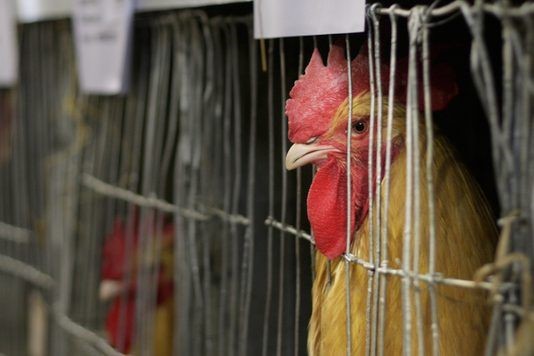Can an end to factory farming and food waste feed the planet?

Industrialised animal rearing - factory farming - is a big factor holding back our ability to feed the world, says Compassion in World Farming CEO Philip Lymbery.
As the CEO of Compassion in World Farming, the leading international farm animal welfare organisation, my sights are set firmly on ending factory farming worldwide for the benefit of animals, people and the planet. I believe passionately that the future of our food relies on achieving truly humane and sustainable food production globally.
 The present failure to feed the world is nothing short of scandalous and requires urgent action. Industrialised animal rearing – factory farming – is a big factor holding back our ability to feed the world.
The present failure to feed the world is nothing short of scandalous and requires urgent action. Industrialised animal rearing – factory farming – is a big factor holding back our ability to feed the world.
One in seven people in the world today are hungry. By the middle of the century, there will be two billion more mouths to feed. The world will need 70-100% more food by 2050 according to the UN. Some have leapt at this to justify ‘sustainable intensification’; a gobbledygook oxymoron; industrial agriculture on a ‘business as usual’ basis with green-wash for window dressing. That approach is fundamentally flawed. The reality is that factory farming is not feeding the world; the grain-feeding of confined animals uses more food than it produces.
Stop wasting food
North America and Europe waste up to half their food. That amounts to enough to satisfy the hunger of the world’s billion undernourished people between three and seven times over.
Much of it ends up dumped in landfill. Much greater effort is needed to reduce food waste. However, the individual effort necessary is small: in the UK, we throw away a quarter of the food that we buy. That is unbelievably wasteful. If we all used the food that we buy and planned our meals more carefully, this could be substantially lowered. We need to love our food more, not waste it.
Put people first
A third of the world’s cereal harvest is fed to farm animals; if it were used directly for human consumption it would feed about three billion people. Industrial livestock production involves feeding vast quantities of human-edible food to confined animals. Under more natural conditions, those animals would convert things that people don’t or won’t eat into edible food for humans. Ruminants, like cows and sheep, will turn grass into meat and milk.
Food Sense
We urgently need ‘Food Sense’ – a common sense approach to feeding the world that puts people first, reduces food waste and is based on sustainable practice for the environment. This would involve:
1. Pasture-reared ruminants: food from ruminant animals, such as beef, lamb and milk, should be produced through grazing on mixed, rotational farms, permanent pastures or marginal lands. This converts plant-life that humans can’t eat into edible food. The wasteful practice of feeding grain to confined cattle for intensively reared beef or milk should stop.
2. Pigs and poultry on food waste and foraging: pigs and poultry are nature’s great foragers and recyclers – the perfect recipients of food waste. They should no longer be factory farmed, but instead returned to the land on mixed farms where they can forage and turn food waste into eggs and meat. The current practice of feeding them cereals and soya squanders vast amounts of food.
3. Food from mixed farms of crops and animals: mixed farms, where animals are rotated with soil-enhancing crop rotations should be encouraged. It’s better for the soil, farm animal welfare and the quality of our food.
4. Fish for people, not livestock: up to a third of the fish landed in the world is not consumed directly by people. It’s used mostly as feed for farmed fish and other livestock. Plundering the seas to feed confined farmed animals is a scandal. Ending the practice would take pressure off over-exploited seas.
5. Avoiding over-consuming meat: most people in the west eat more animal fat and protein than they need. Reducing the consumption of saturated animal fats by 30% would lead to about a 15% reduction in heart disease in the UK and Brazil. Balanced eating would help reduce the impact on our health as well as the environment and animal welfare.
Food Sense would end the competition for food between people and farm animals; reduce and recycle food waste and would support the keeping of animals on farms, not in factories; and deliver more effective food systems geared toward feeding all people, now and in the future.
What are your thoughts on factory farming and food waste? Let us know in the comments box below.
More on these issues
The secret cloned meat in your food
Why the ban on battery eggs might not be so eggs-ellent
Study claims red meat increases health risks
Philip Lymbery is the CEO of Compassion in World Farming. He tweets here.
Comments
Be the first to comment
Do you want to comment on this article? You need to be signed in for this feature